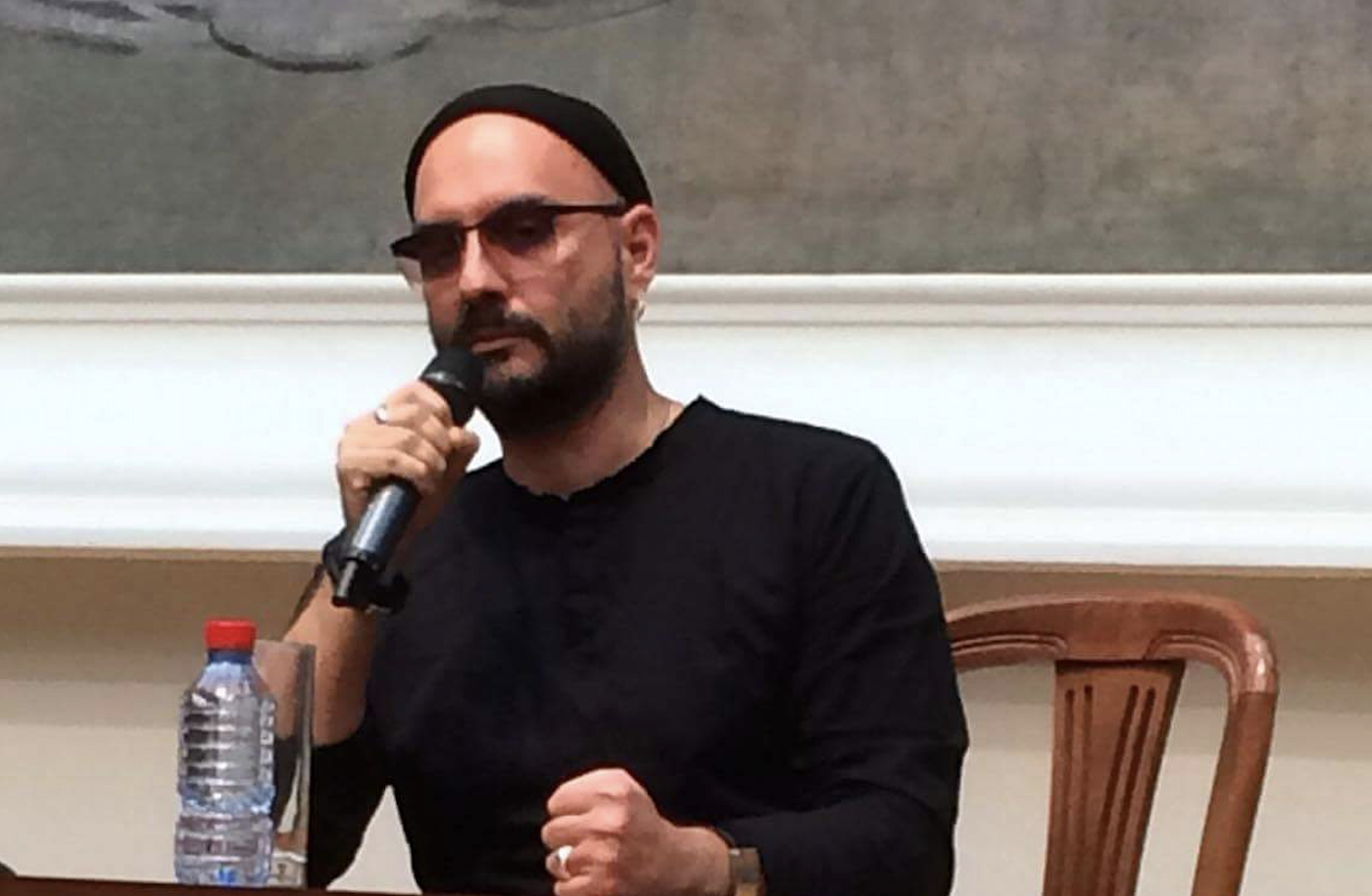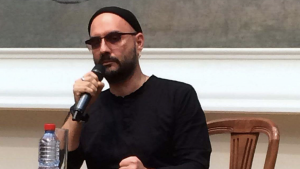30 days with Kirill Serebrennikov
On 17 October 2017, the Basmanny Court of Moscow extended the house arrest for Kirill Serebrennikov, accusing him of embezzling about 70 million rubles from the budget for the development and promotion of contemporary art. The director asked the court to release him at least for the final filming of the movie “Summer” and the completion of the ballet “Nureyev” at the Bolshoi Theater, but he was denied.
Artistic director of the Gogol Center Kirill Serebrennikov was among the nominees of the Russian national theatre prize Golden Mask. Serebrennikov was nominated for the award for staging the opera “Chaadsky” in “Helikon-Opera” and the play “Akhmatova. Poem without a hero” in the Gogol Center. Also the director is nominated in the category costume designer for the opera “Chaadsky“.

One of the most colorful of Serebrennikov’s productions was, as the tag-line informed, about “all shades of black”. Not that Serebrennikov has ever produced anything dull, be it cinema, theatre, TV, or lectures, nor is he producing anything dull at the moment, or will he ever. Men clad in black, men wearing masks, men who have no faces often appeared as characters in his works. Unfortunately, quite recently the director had a chance to make personal acquaintance with these characters of his when they were escorting him into the glass-walled dock in the courtroom. Serebrennikov is nothing like an Ivory Tower dweller, his artistic genius is blessed with social awareness, sensitive to all that is socially relevant, partial to the people for whom “the time is out of joint”. He once was (and has staged the play) “Close to Zero”, and earned some hostile criticism even from those who never saw the show. Dazzled, some by the authorities presumably at play, some by hatred to these very authorities, but equally blind to the real thing, too many failed to see the portents of the final throes to come in that very Shakespearian production, which for the “to be or not to be” dilemma showcases daily routine and jettisoning everything that makes a human human. And no question marks, period. The book ends with the statement: “Anything can be mended,” but the theatre version leaves no room for hope. Yet the optimistically minded director (he has so little time, such a lot of work) neglected his own prophesy, or maybe believed that darkness, however dense and absolute it might be, is still to be won even by the tiniest of lights. Which is quite true. But the costs? The director is in a mousetrap. And now the device is not a Shakespearian one. Today, when the rtist is brought to the trial of public scrutiny, a lot is said about money, people make estimates, they recon, count, calculate. Figures incite malicious rejoicing at another’s misfortune, bear hatred, tempt to shout “tally-ho!”, and pass the verdict “serves him right.” Our people love sums that have many noughts: it lends the feeling of belonging. Meanwhile, leaving playing with numeral and discussing that which happened in the courtroom to the social networks, we suggest that theatre goers and movie lovers (especially those who have never seen any of Kirill Serebrennikov’s productions), refrain from passing judgment on him, but make busy forming an opinion about him, about his artistic accomplishments. So be it 30 days of the month of September with his films, his theatre productions, TV programmes, lectures and interviews – 30 days in his company, 30 days in his support. The following selection contains links and the coming events that are must-sees, and are worth reviewing.
#freeserebrennikov #freekirill
1. “The Student”. Film from 2016. Based on Marius von Mayenburg’s play “Märtyrer”, screened in the Un Certain Regard section at the 2016 Cannes Film Festival, where it won the François Chalais Prize. Chronologically the director’s last completed film that garnered a prize at Cannes, and, as it is always the case with Serebrennikov, earned an upheaval of an audiences’ response. An armour piercing projectile sort of a movie about obscurantism that’s hard to die. 2. “The Forest”. Theatre production of the play by Alexander Ostrovsky produced by A.P. Chekhov Moscow Art Theatre. Great theatrical success. The iconic 19th century Russian play is transported to “the epoch of stagnation” of the 1970s, but curiously is ranked with present-day allusions. 3. "Infidelity”. Film. A man and a woman learn that their respective spouses are lovers. Tackles the theme of infidelity as an overwhelming element of a thriller. 4. “Outside the System” an event in commemoration of K.S. Stanislavsky at A.P. Chekhov Moscow Art Theatre. An anniversary (150th birthday) celebration event about Stanislavsky by means of quoting the great master’s statements, letters, wires, notes, as well as those of his students and colleagues, both devotees and apostates 5. “Zoyka’s Apartment”. Theatre production by Mikhail Bulgakov (A.P. Chekhov Moscow Art Theatre) // TV show “Cultural exchange” with Kirill Sereberennikov as a guest. Daring and even nowadays topical musical show made after Bulgakov’s 1926 play. Serious talk about time, about projects, and about public mood. 6. “The Murderer’s Diary”. TV show from 2002. The discovery of the 1919 diary of a student, Nickolay Voinov, who confesses in it to have murdered five people, becomes the clue to some horrible crimes of our day. A riveting series with some wonderful actor performances. 7. “The Golovliev Family”. Theatre production based on the 1876 novel by Saltykov-Shchedrin. Features possibly the most hideous character ever embodied by Evgeny Mironov. An absorbing story of spiritual devastation. 8. “Playing the Victim”. Film. A dark comedy based on the Presnyakov brothers’s play of the same title that tells the story of a good-for-nothing 30-year-old man whose job is to act the victim when the police is reconstructing a murder in the course of the inquest, and the job is telling on him… 9. “Some Explicit Polaroids”. Theatre production by Mark Ravenhill (the Moscow Pushkin Drama Theatre). A dramatic tale about a rebel, a hippy, a striptease dancer, a gay man dying of AIDS, about his sexual slave, and about love. 10. “Dark Avenues” based on the 1946 book of short stories by Ivan Bunin, a dramatic performance shot for TV broadcasting (a literary soiree). Invited to stage it by Alla Demidova personally. An austere and delicate theatrical piece based on Bunin’s stories. 11. “Yuri’s Day”. Film from 2008. An opera singer, played by Kseniya Rappoport, before leaving the homeland to reside permanently abroad, goes for a short visit to an obscure, out-of–the-way place to say her last goodbyes to the native country. And her son gets lost there. She loses her voice, and all her old worldviews. Yet she is also granted with some findings. 12. “The Philistines”. Theatre production from 1902 by Maxim Gorky (A.P. Chekhov Moscow Art Theatre). This iconic Russian play that premiered in 1902, in the hands of Serebrennikov undergone a complete change of meaning, yet staying absolutely true to the text of the original play. Which is a dramatic piece about a family crisis. A brilliant Andrey Myagkov. 13. “Naked Pioneer Girl”. Theatre production by Mikhail Kononov (the Sovremennik theatre). A musical-and-battle miracle-play. A study on the role of the woman in war examined in other than a full-dress fashion. Chulpan Khamatova in the title role. 14. “Short Circuit” (novella “A Kiss of a Shrimp”). Film. A collection of five short films made by the leading young cinema directors. Five contemporary tales dealing with the theme which is as old as the world itself. Love. A dramatic piece, a comedy, a farce – genre-wise it’s comprehensive. 15. Rostov-Papa. TV show from 2001. A vertical serial, each episode of which is loosely based on a classical story: “Carmen”, “Orpheus and Eurydice”, “Don Quixote”, “Cyrano de Bregerac”, “Hamlet”… 16. “Plasticine”. Theatre production. Some thundering and fulminating based on Vasiliy Sigarev’s play about a 14-year old boy who has been abused, and is being abused daily. 17. “Ragin”. Film. A version of Anton Chekhov’s short story “Ward No.6”, with Alexei Guskov playing doctor Ragin. 18. Fragments of the theatre production “Scumbags” (Gogol Center) and recording of the director meeting his audience before the performance. Theatre version of Zakhar Prilepin’s prose, complete with its signet revolutionary ardor, drive, and hopelessness. It was awarded with the “Gold Mask”. 19. “Antony and Cleopatra”. Theatre production (the Sovremennik theatre). A spectacular confrontation of the male and the female, the East and the West, the old and the new forms. 20. Fragments of the show "The Metamorphoses" (Gogol Center). A theatrical biopic, in which even silence resounds Classical myths as contemporized and placed in the multimedia environment. 21. “One Hundred Minutes of Poetry”, a poetry reading event. Poetry and music performed at the Polytechnic Museum. 22. Fragments of the theatre production “The Hunting of the Snark”. A tragic-comical musical fairy gala loosely based on Lewis Carroll’s nonsense poem. 23. “Substituting Audio Mixing for Dogs”. Film. A rarity – the director’s cinematographic debut, based on La Leçon («The Lesson », 1951) by Eugène Ionesco. 24. A cycle of TV programmes “Another Kind of Cinema with Kirill Serebrennikov”. Talks on the characters of the iconic films of the world cinema, no less fascinating than the films themselves. 25. “Requiem”, a symphonic performance (A.P. Chekhov Moscow Art Theatre). Presented to celebrate the 65th anniversary of the end of the World War II, this mystery play like production became a tribute to commemorate all those killed in the wars that had tormented Europe since the 17th century and up to September 1945. It contains instrumental music, vocal, canon Latin texts, and documents of the 1930s and 40s. 26. Open lecture by Kirill Serebrennikov 27. Fragments of the theatre production “Terrorism”. 28. Big interview with Kirill Serebrennikov 29. Documentary “Der Fall Serebrennikov”. 30. Kirill Serebrennikov in court
Published on 30 November 2017 (Article originally written in Russian)

